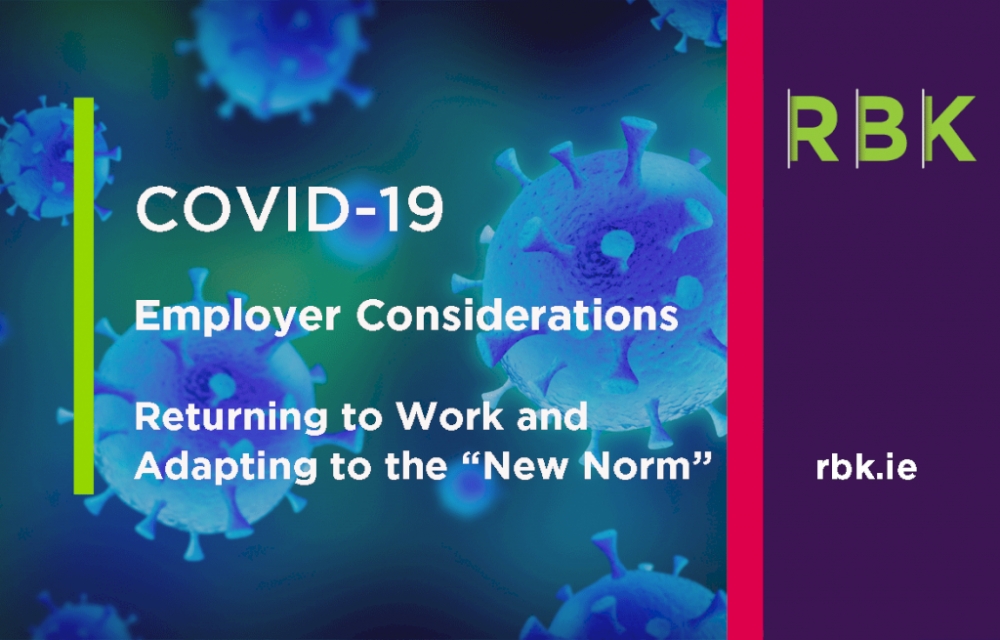Important HR Strategies to Consider Post COVID-19
Returning to Work and Adapting to the “New Norm”
Our HR Solutions team have reviewed and addressed some of the concerns employers have in relation to Return to Work strategies following government restrictions being lifted for different sectors and industries in the coming weeks. Employers now need to consider how the transition can be best carried out.
Employers will need to decide how to facilitate a safe return to the workplace, looking at when the return will take place (gradual re-opening), how it will happen (e.g. team splits, staggered working times, social distancing, protective gear), who will return (e.g. employee and visitor screening, dealing with employees’ refusal to return to the workplace) and on what terms (e.g. pay reductions, business travel and annual leave policies, extended probation periods.)
RBK HR Solutions can advise and guide you through a safe Return to Work Plan and anticipate how to deal with employees concerns regarding their return whilst all the time keeping employment law obligations towards employees at the forefront.
The implications for Employee Relations and Employee Engagement also needs to be considered.
Return to Work Strategy
As the Government restrictions are indicated to loosen for different sectors and industries in the coming weeks, it is important to have a safe Return to Work Strategy in place. Many people may be reluctant to return for many different reasons such as childcare, anxiety and fear, change in employment terms and conditions etc. Many companies will also have to deal with employees being reluctant to return simply because they now prefer staying at home, less travel etc. which may lead to disciplinary action.
Considerations for a Safe Return to Work
Employers need to start thinking about their “Recall” Strategy for employees who have been working remotely, temporarily laid-off or on short-time working.
Companies will need to develop new work practices and structures to ensure a safe working environment while adhering to the HSE and Occupational Health & Safety guidelines to ease employee’s minds in returning to work:
- Appoint a COVID-19 Compliance Officer to monitor and ensure compliance of these new measures of Health & Safety practices
- Worker Representative and a back-up person
- Ensure returning employees complete a Pre-Return to Work Form, at least 3-days prior to their actual return and also requesting employees, at work, to do the same
- Induction training on up-to-date advice, what to do if an employee has symptoms of COVID-19, Response Plan etc
- Policies should be updated to reflect these measures, be it temporary or not
- New measures will need to be considered in relation to building access, communal areas such as wash room facilities, canteen facilities, restrictions using the building lifts one person at a time, or even clock-in systems
- Regular enhanced deep cleaning of the workplace will also need to be considered
- A temporary split-shift roster to minimise employee numbers in the workplace to ensure social distancing requirements can be adhered to
- Introduce a late or earlier start or finish time to allow for the cleaning and sanitation of shared tools or equipment and to prevent gatherings of employees in the workplace at the beginning and end of working hours e.g. at clock machine, main entrance of the building etc
- Consider splitting teams and stagger work day cycles where for example Team A will be working from the workplace for 3 days, while Team B work remotely for those 3 days and rotate
- Enhancing remote working access and ensuring remote work stations are ergonomically correct.
- Ensure remote workstations seating and desk areas are suitable for the task
- Encourage employees to get up and move from their work stations, stretch, and be in the best postures to avoid unnecessary stresses or strains to the body that way lead to musculoskeletal disorder (MSDs) problems.
- MSDs is where people experience back pain, strained/pulled muscles or ligaments. Statistics show that a large percentage of work place absence is related to MSDs.
- Restrictions of public transport – maintaining social distancing whilst travelling to work
- Conduct COVID-19 Return to Work Survey which will give you an insight into your employees thought processes about returning to the workplace
- It can provide you with an insight into where people are at
- It is anonymous so employees can share honestly what they may not ordinarily say
- It will show employers if their communications have been effective
- It will provide employers with what people need collectively, implement the right practices for your employees and put the resources in the right places
- Be sure to let your employees know what you are going to do with their feedback
How can RBK Help?
For more advice and support please contact a member of our HR Clients Solutions team:
- Yvonne Clarke – HR Solutions Manager
- Áine Dunne - HR Consultant
- Niamh Quinn – HR Administrator


